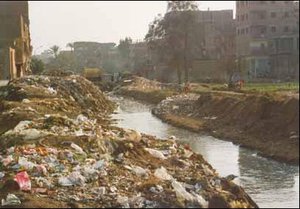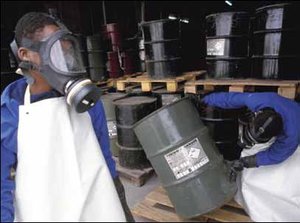Africa's renaissance for the environment: chemicals

Contents
Issues
Although currently Africa is neither a major consumer nor producer of chemicals in global terms, the level of risk faced by poor countries is disproportionately higher than in those with sufficient resources to effectively manage and monitor chemical use. With economic growth, Africa is likely to grow as a producer and consumer of chemical products, increasing the importance of this issue. In particular, Africa will face a growing challenge in the management and monitoring of chemicals due to inadequate human capacity and the lack of technology required for effective monitoring and evaluation (M&E).
The increased use of chemicals, particularly in the agricultural sector, may lead to increased contamination of water sources, with adverse effects for both human and ecosystem health. The increased exposure to agricultural and industrial chemicals and waste exacerbates the impacts of traditional environmental health risks in many developing countries. Contaminated sites and obsolete stocks present serious problems for Africa which require immediate actions. Estimates suggest that across Africa at least 50,000 tonnes of obsolete pesticides have accumulated. Continued trade in hazardous waste is likely to exacerbate this problem and toxic chemicals that enter the environment place a serious threat to biodiversity and ecosystems, causing disease and undermining essential functions.
Outlook
As Africa’s economy grows and gross domestic product (GDP) per capita increases, the consumption of chemicals for domestic use as well as in the agricultural and industrial sectors is likely to grow. With the growing use of chemicals there is likely to be increased exposure to them in the workplace as well as in the home. In the agriculture sector, this will put women and children at increased risk of chemical exposure. In many cases, both in subsistence and commercial farming, producers and workers have insufficient knowledge about the health risks posed by chemicals and therefore do not adopt personal protective measures. As a result, the increased use of chemicals will place new demands on the already fragile health sector.

Increased chemical use will contribute to increased environment degradation and pollution. Developments in the agricultural sector may lead to the increased use of agricultural chemicals, contaminating water sources and threatening ecosystem viability. These developments will place both human and environmental health and well-being at risk. The contamination of water sources may lead to a decrease in the environmental goods-and-services freshwater systems supply, as well as reduce the ability to meet the Millennium Development Goal (MDG) targets on the provision of safe water.
Increased chemical use will increase the risk of chemical production accidents and the likelihood of pollution through industrial waste discharge. This will place a new burden on chemical management systems, and place new challenges on governments to effectively regulate and develop appropriate M&E systems.
Action
Governments should put in place legal and institutional frameworks which ensure effective management of chemicals and embrace core principles as outlined in Agenda 21, including the precautionary approach, producer liability principles, the polluter pays principle, and comprehensive right-to-know lawsthat build on the wide range of multilateral environmental agreements (MEAs) which directly address specific chemical issues.
In developing a framework for chemicals management, an approach that focuses on sound management throughout their life cycle is essential. Specifically, governments’ actions should relate to:
- Risk reduction – prevention of and preparedness for accidents and natural disasters.
- Information and knowledge – improving the accessibility of information on hazardous chemicals.
- Governance – integration of Strategic Approach to International Chemicals Management (SAICM) objectives into national development planning.
- Capacity-building and technical assistance – promotion of life cycle approaches to chemicals management.
- Illegal international traffic – symposium on illegal international traffic in chemicals and hazardous wastes.
At a regional meeting in Abuja, Nigeria in May 2004, African governments adopted a position on SAICM, which seeks to promote synergies and coordination among regulatory instruments and agencies. It proposed the following, among other activities:
- Manage chemicals at all stages of their life cycle, using the principles of “cradle-to-grave” life cycle analysis.
- Target the most toxic and hazardous chemicals as a priority.
- Ensure full integration of chemicals management and better coordination among stakeholders.
- Increase chemical safety capacity at all levels.
- Ensure that children and other vulnerable people are protected from the risks of chemicals.
- Promote corporate social responsibility and develop approaches that reduce human and environmental risks for all, rather than transferring the risks to those least able to cope with them.
- Incorporate the legal approaches or principles of precaution, polluter pays principle and the right-to-know. This must be complemented by a commitment to substitution of toxic chemicals by less harmful alternatives and promotion of more environmentally-friendly practices by industries. This can be achieved through, among other measures, encouraging the private sector to seek compliance with the ISO 14000 standards.
- Integrate the precautionary, life cycle, partnership, liability and accountability approaches in management.
The statement urges that SAICM should be established at national, regional and international levels as a coordinating structure for harmonizing legal instruments and organizations responsible for chemicals management.
Stakeholders
Collaborative efforts between governments, NGOs, the private sector and civil society organizations are essential for building a collaborative and sustainable approach to chemical management. In particular, stakeholders from agriculture, environment, health, industry, labor, consumers and science have a specific interest. The Africa Stockpile Programme (ASP) has prominent partners, the World Bank, Food and Agriculture Organization (FAO), United Nations Environment Program (UNEP), World Wildlife Fund (WWF), the Africa Union (AU) and New Partnership for Africa's Development (NEPAD), who can also play a key role in chemicals management and use.
Result and target date
SAICM implementation is to take place within a 15-year time frame, corresponding to the World Summit on Sustainable Development (WSSD) Johannesburg Plan of Implementation’s 2020 target for the sound management of chemicals. The Johannesburg Plan of Implementation envisaged that by this time chemicals should be produced, managed and used in ways that minimize significant adverse effects on human health and the environment.
Governments should develop tools for participatory risk assessment analysis and procedures for chemical management. Mechanisms for ensuring access to relevant data and information on chemical management issues should also be developed and adopted at the national, regional and international levels. Tools should also be developed for monitoring the effects and impacts of industrial and domestic chemicals while existing laws on chemical management should be enforced.
Further Reading
- MA, 2006. Ecosystems and Human Well-being: Current State and Trends.Volume 1. Millennium Ecosystem Assessment. Island Press, Washington D. C.
- NEPAD, 2003. Action Plan for the Environment Initiative. New Partnership for Africa’s Development, Midrand.
- OECD, 2001. Environmental Outlook for the Chemicals Industry. Organization for Economic Co-operation and Development.
- SAICM, 2004. Report of the African Regional Meeting on the Development of a Strategic Approach to International Chemical Management. SAICM/AfRM/1. Strategic Approach to International Chemicals Management,Abuja. 26-28th May 2004.
- UN, 2004. A More Secure World: Our Shared Responsibility. Report of the High-level Panel on Threats, Challenges and Change. United Nations, New York.
- UN, 1992. Agenda 21. Proceedings of the United Nations Conference on Environment and Development. Rio de Janeiro, Brazil, 3-14 June. United Nations.
- UNEP, 2006. Africa Environment Outlook 2. Nairobi, Kenya.
- UNEP, 2006. Background paper on chemicals management. UNEP/GCss.IX/9/add.2. Background papers for the ministerial level consultations on energy and environment for development, chemicals management as well as tourism and the environment.Addendum.Ninth Special Session of the Governing Council/Global Ministerial Environment Forum, Dubai, 7-9 February 2006. Governing Council of the United Nations Environment Programme, Nairobi.
- WWF, 2004. Causes for Concern: Chemicals and Wildlife. The World Wide Fund for Nature, Gland.
|
|
| Disclaimer: This article is taken wholly from, or contains information that was originally published by, the United Nations Environment Programme. Topic editors and authors for the Encyclopedia of Earth may have edited its content or added new information. The use of information from the United Nations Environment Programme should not be construed as support for or endorsement by that organization for any new information added by EoE personnel, or for any editing of the original content. |